Artificer Meaning in the Bible: Creativity and Craftsmanship
In the Bible, an ‘artificer’ denotes a skilled craftsman or artisan, highlighting human ingenuity and divine creativity. This role is prominently featured in the Old Covenant, particularly in the construction of sacred spaces like the Tabernacle and Solomon’s Temple.
Figures such as Bezalel and Hiram of Tyre reflect God’s meticulous care and the imago Dei—man’s participation in creation. Biblical artificers, inspired with wisdom and knowledge, executed holy tasks, merging divine instruction with human effort.
Exploring these stories further reveals intricate narratives of faith, craftsmanship, and the divine intersection with human skill.
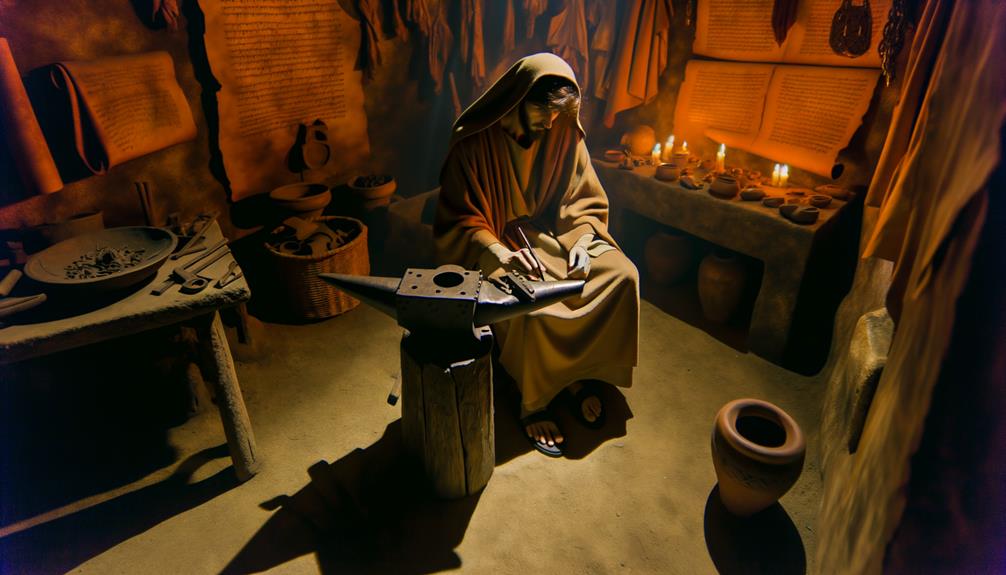
Artificer in the Bible: Meaning, Role, and Spiritual Symbolism
| Aspect | Details |
|---|---|
| Definition | An artificer in the Bible refers to a skilled craftsman or worker in materials like metal, stone, or wood. |
| Biblical References | Mentioned in Genesis 4:22 (Tubal-cain as an artificer in brass and iron) and Exodus 31:3-5 (Bezalel’s craftsmanship for the Tabernacle). |
| Role in Society | Played a crucial role in constructing tools, weapons, and sacred objects, blending skill and creativity. |
| Symbolism | Represents human ingenuity as a gift from God, reflecting divine creativity and purpose. |
| Spiritual Significance | Highlights the value of using talents and skills for God’s glory, such as in building the Tabernacle or creating sacred artifacts. |
| Modern Interpretation | Encourages believers to use their skills and creativity in service to God and others, embracing craftsmanship as a form of worship. |
Biblical Definition of Artificer
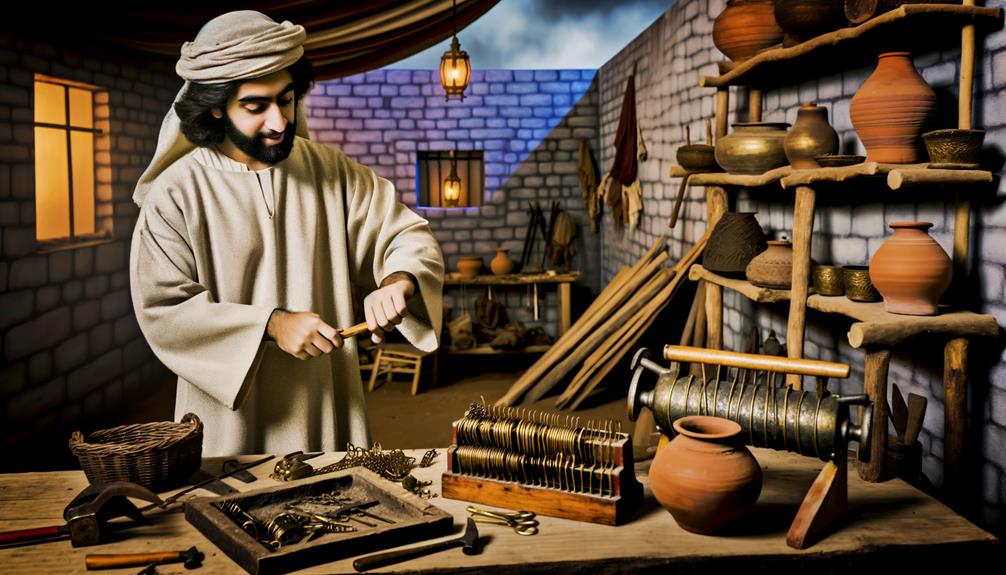
In biblical terminology, an ‘artificer‘ is typically understood as a skilled craftsman or artisan who engages in the creation and fabrication of various objects, often utilizing materials such as metal, wood, or stone. This role is foundational within the scriptural narrative, reflecting divine creativity and human ingenuity.
Theologically, the artificer embodies the imago Dei — the image of God — by partaking in acts of creation.
Historically, artificers were essential in constructing religious artifacts, tools, and infrastructure, thereby facilitating both daily life and worship.
Scriptural analysis reveals that their skills were often considered divinely inspired, as seen in passages like Exodus 31:3-5, where Bezalel is endowed with wisdom and craftsmanship by the Spirit of God, underscoring the sanctity of their work.
Old Testament Artificers
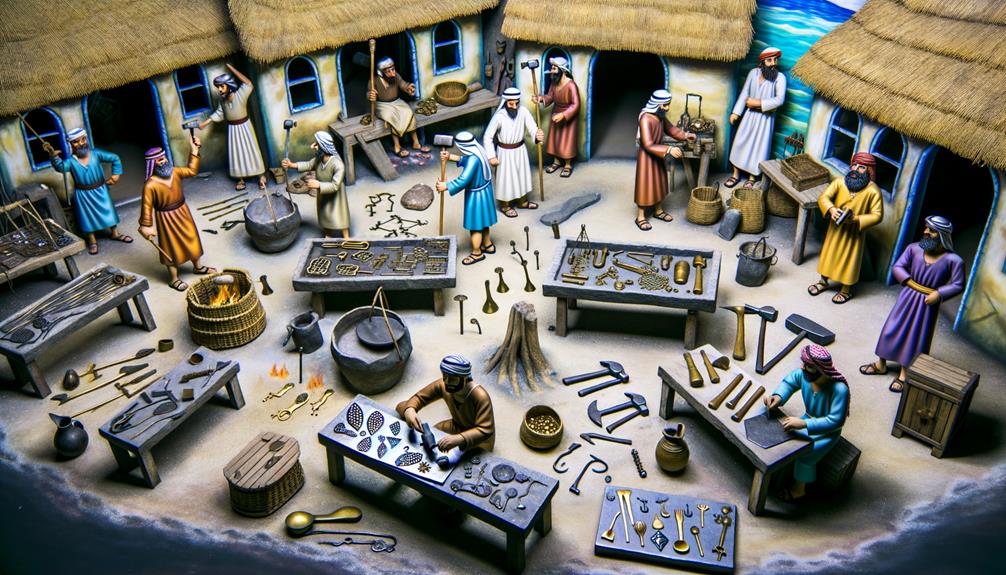
The Old Covenant highlights the significance of artificers through detailed accounts of their contributions to sacred and communal life, particularly in the construction of the Tabernacle and Solomon’s Temple.
In Exodus, Bezalel and Oholiab are divinely endowed with skills in craftsmanship, symbolizing the intersection of divine inspiration and human artistry (Exodus 31:1-6). Their work underscores the theological principle that God equips individuals with specific talents for His purposes.
Similarly, the artisans in Solomon’s Temple, as described in 1 Kings 7, illustrate the historical context where skilled labor was essential for constructing spaces of worship and communal identity.
These biblical accounts offer a rich scriptural analysis of how craftsmanship serves as a conduit for manifesting divine glory in tangible forms.
Artificers in the Tabernacle

Central to the construction of the Tabernacle, artificers like Bezalel and Oholiab exemplified the divine endowment of artistic skills, merging theological insight with practical craftsmanship as detailed in the book of Exodus.
Bezalel, filled with the Spirit of God, possessed wisdom, understanding, and knowledge in all kinds of craftsmanship (Exodus 31:3). Oholiab, his assistant, was similarly endowed. These artisans were tasked with creating sacred objects, embodying divine instructions.
| Artificer | Skills | Biblical Reference |
|---|---|---|
| Bezalel | Wisdom, Craftsmanship | Exodus 31:2-5 |
| Oholiab | Assisting, Weaving | Exodus 31:6 |
| Artisans | Metalwork | Exodus 31:4 |
| Weavers | Textile Production | Exodus 31:6 |
| Woodworkers | Carpentry | Exodus 31:5 |
Through their work, the Tabernacle became a physical manifestation of divine presence.
Solomon’s Temple Builders
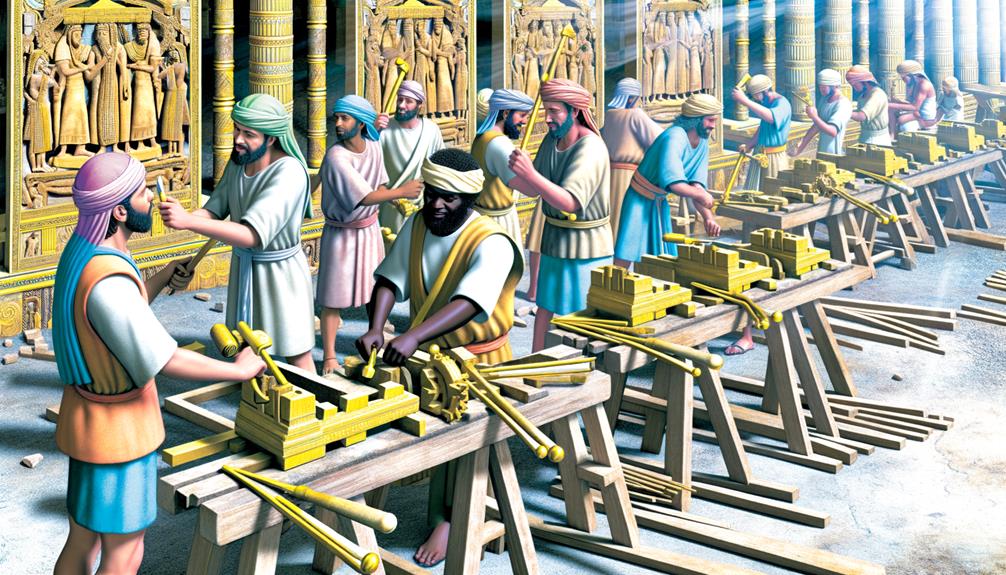
Tasked with erecting a sanctuary of unparalleled splendor, the builders of Solomon’s Temple were divinely guided craftsmen, meticulously executing the detailed instructions provided by God.
Solomon enlisted Hiram of Tyre, a master artisan renowned for his skill in bronze work (1 Kings 7:13-14).
The construction, which began in the fourth year of Solomon’s reign, was a monumental feat, lasting seven years (1 Kings 6:1).
These artisans, including stonemasons and woodworkers, utilized materials like cedar from Lebanon and gold overlays, reflecting the temple’s divine purpose.
Scripture highlights the precision and dedication of these workers, fulfilling God’s vision through their exceptional craftsmanship, thereby establishing a sacred space for worship and the Ark of the Covenant (1 Kings 6:19-22).
Divine Inspiration in Craftsmanship
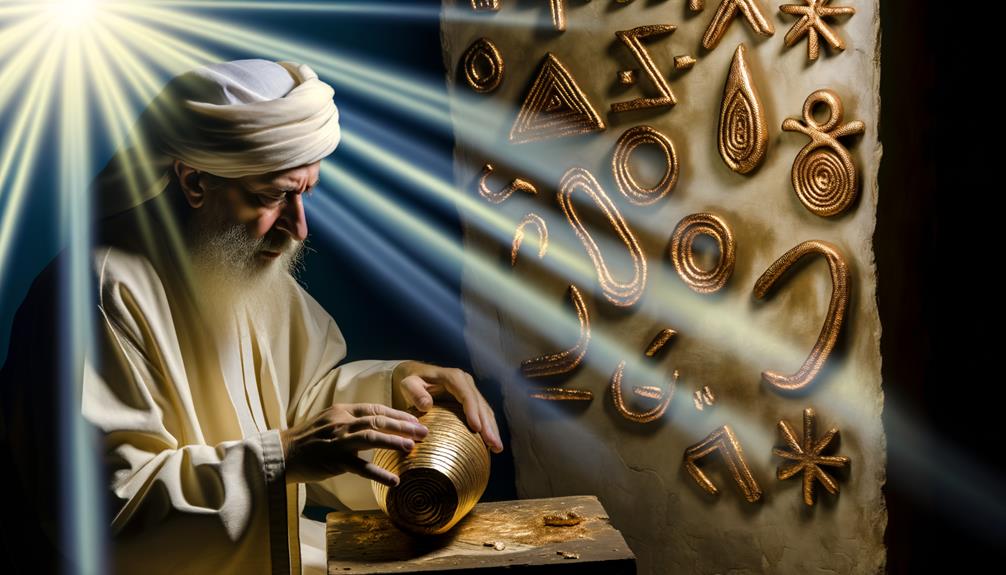
Frequently, biblical accounts underscore that the artistry of ancient craftsmen was profoundly influenced by divine inspiration, imbuing their work with a spiritual dimension that transcended mere skill. This theological insight is vividly illustrated in several scriptural passages, revealing how divine guidance played a vital role in craftsmanship.
For example:
- Exodus 31:2-5 – Bezalel is filled with the Spirit of God, gaining wisdom, understanding, and knowledge for the construction of the Tabernacle.
- 1 Kings 7:13-14 – Hiram of Tyre is endowed with exceptional skill by God to create Solomon’s Temple furnishings.
- Isaiah 28:24-26 – Farmers receive divine instruction for their work, reflecting God’s provision of skill and wisdom.
These instances highlight the sacred nature of their endeavors.
Symbolism of Artificers
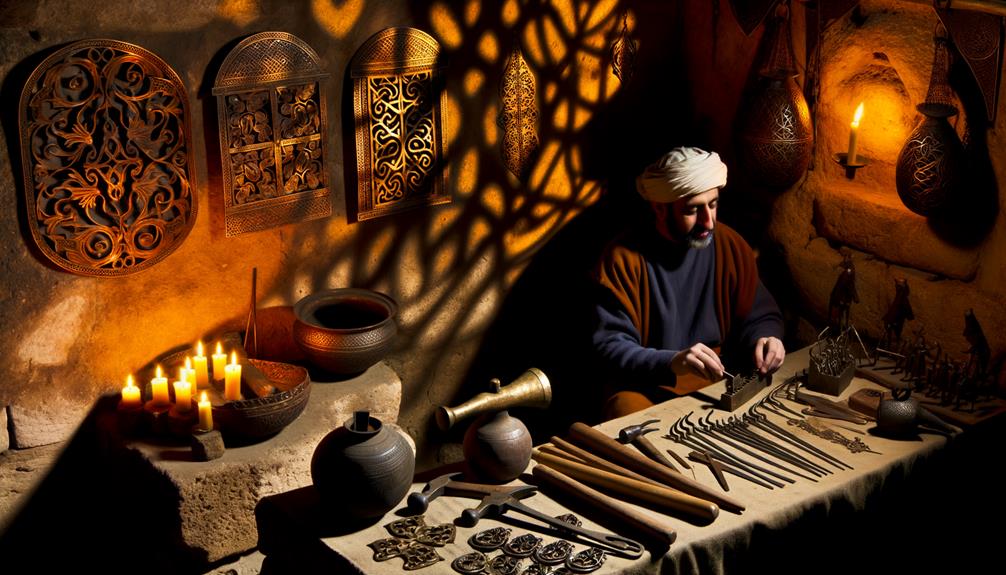
The profound influence of divine inspiration on ancient craftsmen not only underscored their sacred endeavors but also imbued their roles with rich symbolic significance within biblical narratives.
Artificers, such as Bezalel and Oholiab in Exodus, were divinely endowed with wisdom and skill, symbolizing God’s creative power and meticulous care in the construction of the Tabernacle. Their craftsmanship represented not just human ingenuity but divine order and beauty, reflecting the heavenly blueprint on earth.
In the prophetic literature, the work of artificers often symbolized restoration and renewal, as seen in the rebuilding of Jerusalem’s walls by Nehemiah.
Consequently, biblical artificers are emblematic of the harmonious collaboration between divine will and human effort in manifesting sacred spaces.
Modern Interpretations

Modern interpretations of the biblical artificer extend beyond ancient craftsmanship to include contemporary technological advancements, reflecting the evolving nature of human ingenuity as inspired by scripture.
By examining the relevance of these skills in today’s faith communities, one can discern how biblical principles of creativity and problem-solving are manifested in current vocational practices.
This exploration underscores the continuity of divine inspiration in human skillsets from antiquity to the present.
Technological Symbolism in Scripture
In examining technological symbolism within Scripture through modern interpretations, one must consider how biblical narratives reflect humanity’s evolving relationship with creation and innovation.
The Bible, rich with metaphor and allegory, uses technology as a lens to explore divine-human interaction and ethical stewardship.
Key examples include:
- Noah’s Ark (Genesis 6-9): Represents divine instruction and human ingenuity in building a vessel for salvation.
- The Tower of Babel (Genesis 11:1-9): Symbolizes human ambition and the limits of technological prowess against divine will.
- The Tabernacle (Exodus 25-31): Reflects divine craftsmanship, with detailed instructions for creating a sacred space.
These instances demonstrate how scriptural technology underscores theological themes of obedience, hubris, and sacred craftsmanship.
Relevance in Contemporary Faith
Examining the role of technological motifs within biblical texts offers contemporary faith communities a deeper understanding of how these ancient narratives can inform and shape modern ethical and spiritual practices.
For instance, understanding the anointing oil significance in scripture reveals the intersection of physical elements and divine authority in biblical practices. This exploration not only highlights the importance of ritual in ancient times but also encourages modern believers to seek tangible symbols of their faith.
By integrating these motifs into their lives, communities can foster a richer spiritual experience and cultivate ethical living rooted in historical wisdom.
For instance, the figure of the artificer exemplifies human creativity and divine inspiration, highlighting the sanctity of craftsmanship. Scriptural references to artificers, such as Bezalel, who constructed the Tabernacle, illustrate the profound connection between skilled labor and worship.
This historical context provides a framework for modern believers to view technological advancements as potential instruments of faith rather than mere secular tools.
Through a scriptural analysis, contemporary Christians are encouraged to reconcile their technological engagements with their spiritual convictions, fostering an integrated approach to faith in a modern world.
Biblical Skillsets Today
How do ancient biblical skillsets resonate within today’s faith communities, particularly as they navigate the complexities of modern technological landscapes? By examining the role of the biblical artificer, we can draw valuable insights into contemporary applications:
- Creative Stewardship: Biblical artisans, like Bezalel, embodied divine creativity (Exodus 31:1-5), inspiring modern believers to harness creativity in technology and art.
- Ethical Craftsmanship: Scriptural mandates for integrity in work (Proverbs 22:29) guide today’s professionals in maintaining ethical standards amidst technological advancements.
- Community Building: Just as ancient artisans contributed to the Tabernacle, modern technologists can foster community and spiritual growth through innovative platforms.
These interpretations underscore the timeless relevance of biblical skillsets, encouraging faith communities to integrate ancient wisdom with contemporary innovation.
Conclusion
The role of the artificer in biblical texts is monumental, transcending mere craftsmanship to embody divine inspiration and sacred duty.
From the meticulous construction of the Tabernacle to the grandiose edifices of Solomon’s Temple, these skilled individuals were instruments of God’s will, weaving spiritual significance into every artifact.
Their work, steeped in profound symbolism, continues to resonate, offering modern interpretations that bridge the ancient and contemporary, the earthly and the divine, in a timeless representation of divine creativity.






